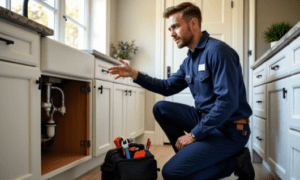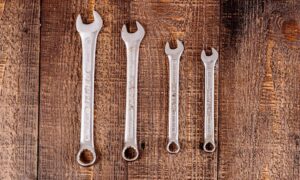A well-installed and maintained plumbing system prevents water wastage, safeguards structural integrity, and promotes health. Plumbing requires a comprehensive understanding of building codes, safety standards, and mechanical operations. Professional plumbers are skilled at resolving drainage issues such as leaks and blockages and providing general installation and maintenance services. Here are some of the responsibilities of a plumber:
Maintain and Repair Plumbing Systems
Plumbers are responsible for maintaining and repairing all plumbing systems, including fixtures, fittings, and appliances. They have to diagnose the cause of any problem using their knowledge of plumbing systems and equipment. This could involve inspecting various components such as faucets, toilets, or water heaters to determine the source of a leak or blockage. A drainage expert must also be able to identify any potential issues with the plumbing system and take preventive measures to avoid future problems.
Install Pipes and Tubes
Pipes and tubes can carry water, gas, and other waste materials. Plumbing contractors help to install pipes and tubes in various plumbing systems, such as water supply, drainage, and vent. Pipe installation involves following blueprints, determining the appropriate materials, and complying with local building codes and regulations. They must know different types of pipes, such as PVC, copper, and PEX. Plumber contractors can connect them properly using fittings or soldering techniques. When installing pipes, a drain technician considers the water pressure in a building to prevent leaks or bursts. They may use tools such as pipe wrenches, pipe cutters, and threading machines to cut and shape pipes for proper installation.
Inspection and Troubleshooting
There are times when plumbing systems break down due to wear and tear, age, or environmental factors. Plumbing contractors must conduct a thorough inspection of the affected area to determine the source of the problem. They use specialized tools such as cameras and leak detectors to identify the cause and location of a leak or blockage. A plumbing expert can troubleshoot and find a suitable solution to fix the problem. This could involve repairing or replacing damaged components, clearing clogs, or adjusting water pressure. Inspections help in preventive maintenance, as a plumbing expert can identify and address potential issues before they become major problems.
Emergency Services
Plumbing emergencies can happen anytime, causing inconvenience and potential damage to a property. This could be a burst pipe, an overflowing toilet, or a clogged drain. Reputable plumbing companies can offer 24/7 emergency services to handle urgent situations. They have a team of skilled plumbing contractors ready to respond quickly and efficiently to minimize further damage. Emergency services may include temporary fixes, such as shutting off the water supply or using temporary patches until a permanent solution can be implemented.
Upgrading and Renovations
Homeowners may also require the services of plumbers when upgrading or renovating their properties. This could involve installing new plumbing fixtures, such as sinks, toilets, and showers, or rerouting pipes to accommodate layout changes. Plumbing contractors can provide advice on the appropriate options for the specific needs of a property, as well as handle all the necessary installation and connections. A plumbing expert can also assist with kitchen or bathroom renovations by providing services such as installing new faucets, sinks, and garbage disposals.
Reading Blueprints
A plumbing professional can interpret and work from blueprints, drawings, and specifications to plan and execute plumbing installations. When working on a new construction project, plumbers work closely with other contractors, such as electricians and HVAC technicians. They must understand the layout and design of the property for proper placement and connections of plumbing fixtures. Blueprints guide plumbers to verify that all plumbing installations align with a property’s overall design and functionality.
Preparing Cost Estimates for Clients
Plumbing contractors also have the necessary skills to provide accurate client cost estimates. Where large projects are concerned, they can prepare detailed proposals outlining the scope of work, materials needed, and projected costs. This allows clients to make informed decisions about their plumbing needs and budget accordingly. When working with a plumbing contractor, homeowners can benefit from getting multiple estimates to compare prices and services offered.
Hire Reliable Plumbers
The responsibilities of professional plumbers are extensive and varied, ranging from installation to repair and maintenance. The job requires a high level of skill and expertise in adherence to safety standards and regulations. When seeking plumbing services, choose a reputable plumber for quality work. An expert can offer professional help to homeowners and businesses alike on their projects.



































